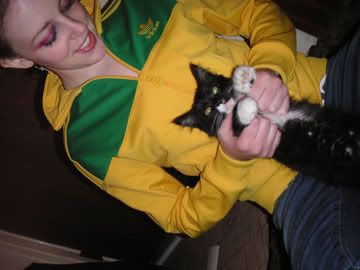Galapagos follows in the tradition of Vonnegut by being "all over the place"; it's not quite linear, includes lots of characters, and may be considered weird. Suffice it to say, I recommend it. I guess it's a little sci-fi (so, you know, he makes a few points). It's not like, robots-and-spaceships sci-fi, mind you, but it is certainly speculative.
Our narrator, Leon Trout, is a ghost who can't go into that blue tunnel known as the Afterlife for one million years (he has a fractured relationship with his father, sci-fi scribe Kilgore Trout). Galapagos is his recording of what happens to the human race from 1986 to 1,001,986. In this time, we hear a little bit about the downfall of humans... if you could call it that. You might call it, like Darwin, Survival of the Fittest. You see, some poor saps on the "Nature Cruise of the Century" land on an island in the Galapagos chain. And one million years from now, all humans claim this small group as common ancestors. We eventually all have silky fur, fins, and small brains.
I mentioned before Vonnegut makes some points—he is known for being satirical, a master of black comedy. Galapagos skewers the human race, sure: we all have these big ol' brains, and you know what we do with them? Yeah, the shit we come up with is ridiculous. We bomb, we con, we swindle, and occasionally love and comfort each other.
Leon remains a ghost for so long because he likes doing "research." As a ghost he can see everything and read minds. But really, what is there to learn about people? As his father Kilgore points out (p. 254):
"The more you learn about people, the more disgusted you'll become. I would have thought that your being sent by the wisest men in your country, supposedly, to fight a nearly endless, thankless, horrifying, and finally, pointless war [Vietnam], would have given you sufficient insight into the nature of human to last you throughout all eternity!So, as we've come to realize, sci-fi is more than androids, hovercraft and space travel. It is timeless. Although the above excerpt was published in 1985, it packs the same punch today. Man, the fact that literature published decades (or centuries, eons, etc.) ago can remain relevant slays me.
"Need I tell you that these same wonderful animals, of which you apparently still want to learn more and more, are at this very moment proud as Punch to have weapons in place, all set to go at a moment's notice, guaranteed to kill everything?"
Really, it gets me every time *tear*.
KK
Next up: The Biker Ghouls From Hell Book Club still isn't up, so I can't crack open The Road or Hell's Angels yet. I'm on this sci-fi kick, so I think I'll continue with some short stories from Science Fact/Fiction or Space Opera: An Anthology of Way-Back-When Futures.

No comments:
Post a Comment